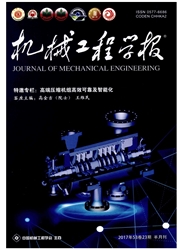

 中文摘要:
中文摘要:
基于线性稳定性理论,推导出描述超空化时分裂液滴内空化气泡稳定性的数学模型;在此基础上,从分裂液滴内空泡的受力角度对空化气泡的时间稳定性进行研究。研究结果表明,液滴黏性力使空泡稳定性增强;相对于空气及空泡的黏性力而言,液滴黏性力对空泡的稳定性起主导性作用。空泡惯性力是影响空泡稳定性的主要因素,对空泡稳定性具有不利影响,其影响程度与空泡液滴半径比密切相关,空泡惯性力对空泡稳定性的影响随空泡液滴半径比的增大而显著增强。空泡可压缩力、液滴内部气动力以及空泡液滴界面处的表面张力有利于空泡稳定,其变化对空泡稳定性的影响受空泡液滴半径比的影响相对较小;液滴外部气动力对空泡稳定性的影响相对较小。建立分裂液滴内空化气泡临界破碎准则,并对分裂液滴内空化气泡的破碎进行分析;分析结果表明,空泡维持时间受空泡生长速度和空泡液滴半径比的影响;对于某一确定初始空泡液滴半径比的分裂液滴来说,有其最大空泡极限破碎半径;空泡极限破碎半径随初始空泡液滴半径比的增加而减小。
 英文摘要:
英文摘要:
The linear stability theory is used to derive a new analytical form of dispersion equation which can be used to describe the diesel cavitation bubble growth stability. The effects of various forces on the temporal stability of cavitation bubble are studied by solving the dispersion equation. The results show that viscous force of the diesel droplet makes cavitation bubble more stable. In addition, compared with the viscosities of air and bubble, the droplet's viscosity plays a dominant role on the stability of cavitation bubble. The adverse effect of inertial force on the stability of cavitation bubble is the major factor, which has a great relationship with the bubble-droplet radius ratio, and its effect increases rapidly with the increasing of the radius ratio. The compressibility force, the internal aerodynamic force and the surface tension have beneficial effects on the stability of cavitation bubble, and the effect has less relevance to the bubble-droplet radius ratio. The outside aerodynamic force has little impact on the stability of cavitation bubble. At the same time, the breakup of cavitation bubble is studied based on the built breakup criterion, and the result reveals that both the bubble growth speed and the initial bubble-droplet radius ratio have great influence on the breakup of cavitation bubble, there is a maximum breakup radius for a droplet which has certainly initial bubble-droplet radius ratio, and the limited breakup radius gradually decreases with the increasing of initial bubble-droplet radius ratio.
 同期刊论文项目
同期刊论文项目
 同项目期刊论文
同项目期刊论文
 期刊信息
期刊信息
